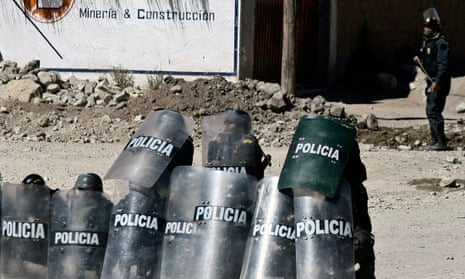A UK-registered mining company, which is now part of Glencore, is facing claims in a London court that it hired security forces to mistreat environmental activists protesting about a copper mine in Peru.
Two demonstrators died and others were left with serious injuries following the confrontations which lasted for several days during May 2012 on a remote hillside in the Andes, the court has been told.
The two-week trial of the mining company, Xstrata, being held at the Rolls Building in central London, where commercial cases are heard, will be determined under Peruvian law. It is taking evidence from leading legal experts.
Two of the protesters, Sergio Huamani and Alberto Huallpa, went to London to attend the hearing, which is being translated into Spanish and English.
Lawyers for Xstrata argue that the claims have been brought too late and should be barred under a statute of limitations which imposes a two-year time limit. But Phillippa Kaufmann QC, for the claimants, maintained the cases were not out of time.
The copper mine in Peru was at the time owned by Xstrata Tintaya, a firm later renamed Companía Minera Antapaccay. Xstrata was alleged to have paid the equivalent of £700,000 for the services of about 1,300 Peruvian national police and provided them with weapons such as rubber bullets and teargas, as well as food and accommodation.
It is alleged that the company encouraged the security forces to mistreat the eco-protesters, who had gathered near the Tintaya copper mine near the town of Espinar. Demonstrators were shot and beaten by officers, it was claimed.
The company denies liability, arguing that police protection was necessary since thousands of protesters, many carrying traditional slingshots, were marching towards the mine. Xstrata also said that the Peruvian national police operated independently and it had no control over their behaviour.
At an earlier hearing, in July 2016, emails from Charles Sartain, an Xstrata director, to the senior South America manager, Jose Marun, were disclosed. These proposed that a “direct, proactive and strong approach” be taken to confront community representatives who were referred to as “sons of whores”.
The court has also been told that in the run-up to the protests in 2012 the mining company “covertly monitored” community meetings and employed informants, sharing its intelligence with the police.
During the fighting, it is said, private security officers employed by the mine wielded metal bars and planks of wood. Some protesters allegedly were shot, others beaten on the head or on the soles of their feet. In one clash, the court was told, police fired machine guns and shotguns.
The 22 Peruvians who have brought the claim are represented by Leigh Day, the London law firm which specialises in class action disputes.
Before the hearing, Sergio Huamani, 42, a farmer, said: “I was attacked severely by the police and beaten on my head and nose because I was protesting about the environmental impact of the copper mine. I hope we will find justice here. The mine is still producing copper and has expanded. It is working without social or environmental responsibility.”
Alberto Huallpa, 29, an accountant, said he had been shot in the left thigh by a bullet. “We are opposed to contamination caused by the mine,” he said. The pollution was “getting into water courses and streams”. The damage, he alleged, was caused by heavy metals including cadmium and arsenic. “We turned up for the protest because the company was not listening to us. I am glad to bring my complaint here so that our pain and suffering comes to the court.”
Xstrata was taken over by the minerals and trading conglomerate Glencore in 2013. It denies that the mine is causing pollution and insists that it complies with environmental laws.
The hearing continues.
